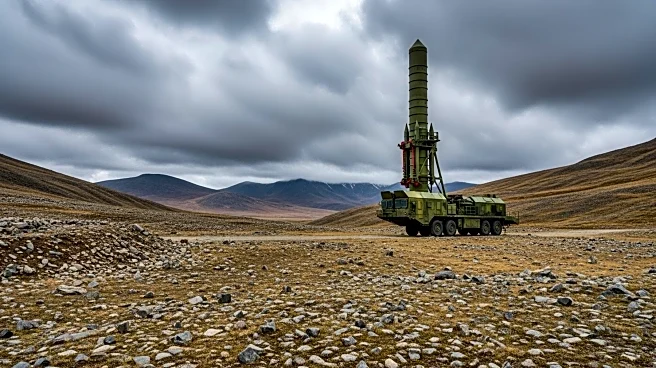What is the story about?
What's Happening?
North Korea, under the leadership of Kim Jong-un, has been showcasing its military might during the 80th anniversary celebrations of the Korean Workers’ Party. Despite possessing a formidable military arsenal, including nuclear weapons and advanced missile systems, Kim Jong-un's focus on military expansion has left little room for economic development. The country's military-industrial complex consumes a significant portion of its GDP, limiting opportunities for improving the lives of its citizens. The celebrations included high-profile international guests, highlighting North Korea's strategic alliances amid global tensions. However, experts warn that the emphasis on hard power undermines potential economic growth and social development.
Why It's Important?
North Korea's military focus presents a complex challenge for international relations and regional security. The country's reliance on military strength as a deterrent against perceived threats from the U.S. and its allies has significant implications for peace and stability in the region. The economic stagnation resulting from prioritizing military investments over development could lead to internal discontent and further isolation from the global community. Additionally, North Korea's role as a supplier of arms to Russia amid the Ukraine conflict highlights its strategic importance in global geopolitics, potentially affecting diplomatic negotiations and sanctions.
What's Next?
Kim Jong-un may continue to leverage North Korea's military capabilities in diplomatic negotiations, seeking concessions such as sanctions relief. However, his refusal to denuclearize limits the potential for significant policy shifts. The international community, including the U.S. and South Korea, may need to reassess their strategies in dealing with North Korea, balancing deterrence with diplomatic engagement. The ongoing military expansion could lead to increased tensions and potential conflicts in the region, necessitating careful monitoring and response from global powers.
Beyond the Headlines
The situation in North Korea raises questions about the sustainability of governance models that prioritize military strength over economic and social development. The lack of soft power and cultural influence limits North Korea's ability to engage positively with the global community. The focus on military might as a means of maintaining control reflects broader challenges faced by authoritarian regimes in balancing power and prosperity. Long-term shifts may include increased pressure for reform and potential changes in leadership dynamics within North Korea.
















